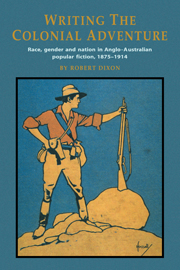 Writing the Colonial Adventure
Writing the Colonial Adventure Book contents
- Frontmatter
- Contents
- List of Illustrations
- Acknowledgements
- Introduction
- 1 The Romance of Property: Rolf Boldrewood and Walter Scott
- 2 Outlaws and Lawmakers: Boldrewood, Praed and the ethics of adventure
- 3 Israel in Egypt: The significance of Australian captivity narratives
- 4 Imperial Romance: King Solomon's Mines and Australian romance
- 5 The New Woman and the Coming Man: Gender and genre in the ‘lost-race’ romance
- 6 The Other World: Rosa Praed's occult fiction
- 7 The Boundaries of Civility: Australia, Asia and the Pacific
- 8 Imagined Invasions: The Lone Hand and narratives of Asiatic invasion
- 9 The Colonial City: Crime fiction and empire
- 10 Beyond Adventure: Louis Becke
- Conclusion
- Notes
- Select Bibliography
- Index
1 - The Romance of Property: Rolf Boldrewood and Walter Scott
Published online by Cambridge University Press: 05 November 2011
- Frontmatter
- Contents
- List of Illustrations
- Acknowledgements
- Introduction
- 1 The Romance of Property: Rolf Boldrewood and Walter Scott
- 2 Outlaws and Lawmakers: Boldrewood, Praed and the ethics of adventure
- 3 Israel in Egypt: The significance of Australian captivity narratives
- 4 Imperial Romance: King Solomon's Mines and Australian romance
- 5 The New Woman and the Coming Man: Gender and genre in the ‘lost-race’ romance
- 6 The Other World: Rosa Praed's occult fiction
- 7 The Boundaries of Civility: Australia, Asia and the Pacific
- 8 Imagined Invasions: The Lone Hand and narratives of Asiatic invasion
- 9 The Colonial City: Crime fiction and empire
- 10 Beyond Adventure: Louis Becke
- Conclusion
- Notes
- Select Bibliography
- Index
Summary
Men cannot enjoy the rights of an uncivil and of a civil state together.
Edmund Burke, Reflections on the Revolution in France, 1790If the book-sellers' catalogues and the holdings of colonial libraries are any indication, the most popular novelist in the Australian colonies during the first half of the nineteenth century was Sir Walter Scott, whose novels were imported in their thousands. Scott wrote little that was directly about the empire, but his depictions of the Scottish Highlands were resonant with implications for England's colonies, past and present. This goes some way toward accounting for his remarkable popularity in Canada, the United States, Australia and New Zealand. Following James Fenimore Cooper's example in America, the Australian writer Thomas Alexander Browne modelled his career, his dozen or so novels and even his pen-name ‘Rolf Boldrewood’ on a deliberate filiation with Sir Walter Scott. In this chapter it is argued that ‘Rolf Boldrewood’ found in Scott's novels a version of the adventure tale which had a shaping influence on his own fictional construction of Australia in the years before Federation. That formal influence is particularly apparent in The Miner's Right (serialised in 1880), his first major novel before Robbery Under Arms.
Narrative, as Fredric Jameson argues, is a socially symbolic act, a ‘form of reasoning’ about experience and society, whose task is to produce fictional resolutions to real social contradictions.
- Type
- Chapter
- Information
- Writing the Colonial AdventureRace, Gender and Nation in Anglo-Australian Popular Fiction, 1875–1914, pp. 15 - 29Publisher: Cambridge University PressPrint publication year: 1995


